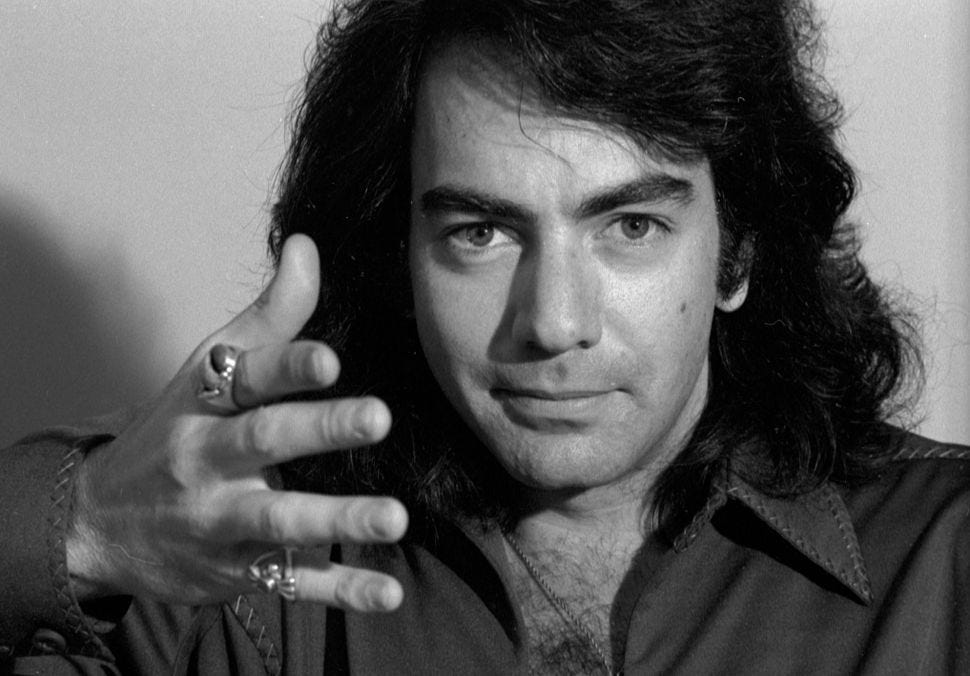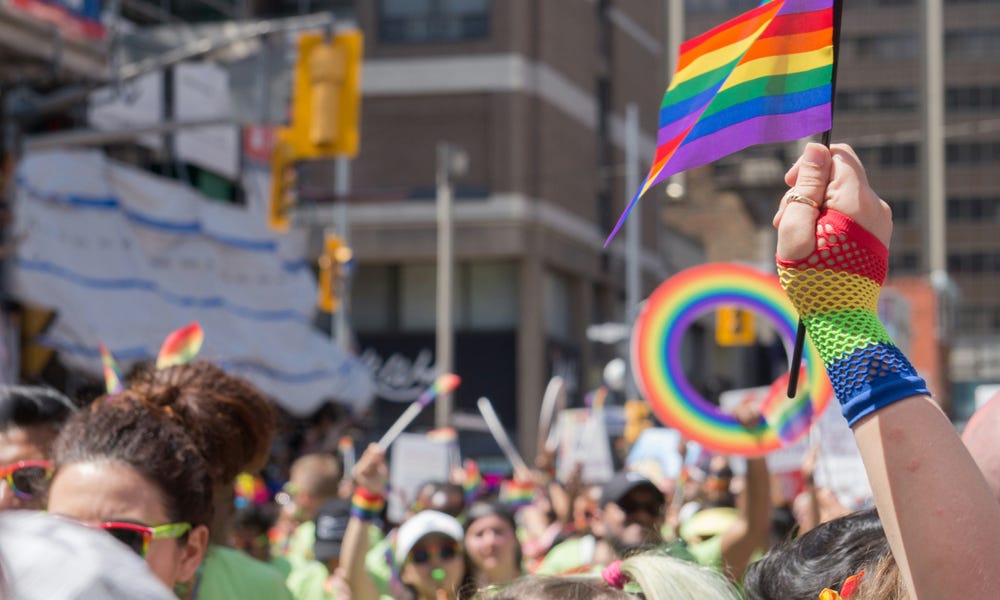Pride on the Rocks
There’s nothing like a negative bottom line to signal your enterprise is flagging and prompt your shareholders to reevaluate whether they should buy, sell or hold.
Love on the rocks—ain’t no surprise. So goes the aching refrain in Neil Diamond’s 1981 hit ballad lamenting a collapsed relationship. Today, in July of 2025, in Canada, those words could easily apply far more broadly.

In Canadian geopolitics, emerging Alberta separatism is the type of turmoil that law professor Bruce Pardy recently argued is essential for catalysing change. The same sentiment could equally well apply to our social milieu where the sudden fragmentation of entities—until five minutes ago thought to be the fever dream of fantasists—is now looking like a shoo-in.
Cracks are apparent along multiple societal fault-lines, but none is more germane right now than the split affecting the gay community, a once rightly proud and defiant segment of society that rose to wider prominence in the Eighties and Nineties, and now struggles under the yoke of its unwieldy, hyperpoliticised and ever lengthening WiFi-password acronym: 2SLGBTQIA+.
The annual place-marker for this collective demographic is Pride—a fixture that was once synonymous with all that was good about modern liberal progressive thinking. But in recent years Pride has mutated into a hodgepodge of libertinism, hypersexualised displays, the normalisation of bizarre fetishism and, arguably most egregious, a penchant for paradoxical activism from the political extremes of the left.
Watching a march that includes grown men cavorting in chaps—and little else—while young children wander along Yonge Street, handholding their permissive parents and waving rainbow pinwheels, was always going to strike a chord of cognitive dissonance among conscientious gays like me.

For those of us lucky enough to have lived through the intoxicating thrill-ride that was gay liberation—the recognition of our relationships in law and the acceptance of our lives as a valid component in the social fabric of Canada and the wider West—was an emotional watershed.
Yet, many of us GenX-ers were not tone-deaf to the precariousness of this success. We knew we had effectively decoupled ourselves from the nervous murmurings among ordinary Canadians that the wholesale acceptance of same-sex attracted people might conceivably cross the threshold into a world of sexual peccadillos, deviancy and behaviours that go so far as to threaten minors. But the divorcing of such beliefs was only sustainable so long as the moderate-minded remained at the wheel of the rainbow bus. And, let’s face it, we didn’t.
It looks daft in retrospect, but with the culmination in 2005 of the Pride movement and the enshrining into Canadian law across the country of same-sex marriage, many of us in the ‘legacy’ gay community simply clocked off. This was an enormous error of collective judgement. In the ensuing decades, individuals who had built a career in the pursuit of same-sex equality cast around for alternative causes to lengthen their organizations’ runways; and—Queers for Palestine take note—rather than, championing gay liberation in the dozen nations where such lifestyles are penalised by the death penalty, they opted to onboard trans-activism.
Historically, the concept of ‘trans’ has always segued with gay culture, not least because of the overt prevalence of transvestites and drag queens in the community, and because a substantial portion of trans-women are, in fact, autogynephilic men—males who are aroused by posing as the opposite sex. It’s hardly surprising that people with such unconventional interests would inevitably gravitate to the gay community for solace and acceptance; and most of us welcomed these newcomers with open arms, reasoning there was strength in solidarity among our marginalised groups.
But this was a marriage of convenience. Many gay people, accustomed more to the almighty hangover from an all-night circuit party, have now awoken to the alarming collateral damage that some—but by no means all—of these fellow travellers would wreak on their movement.
The fissures first appeared a decade ago when Drag Queen Story Hour (DQSH) was conceptualised in San Francisco by Michelle Tea, a woman who has identified variously as a lesbian, bisexual and queer—aiming to bring the joy of alternative lifestyles into kindergarten. As the activist and academic Harris Kornstein revealingly remarked in 2021, “[DQSH] is a preparatory introduction [for children] to alternate modes of kinship.” This was an enormous red flag that went unnoticed.
Meanwhile, the collective rush to funnel young gender dysphoric—but largely gay—people down a path of transition involving puberty blocking medication, cross-sex hormones and ultimately irreversible surgeries—a bubble that has been irreparably punctured by last year’s Cass Review at long last spilling across the Atlantic—has given many a gay man pause for self-reflection. That might have been me.
More lately still, widespread acts of transparent workplace virtue signalling are quickly falling out of fashion and parenthetical pronouns are dropping like flies from email signatures. A fashion that hurtled to prominence with Jordan Peterson’s disavowel of coercive language ushered into law by Bill C-16 has long passed its zenith and is likely to vanish with barely a whimper.
Universities are typically five years behind the curve on almost anything relevant happening in the world; and, predictably enough, the fruitcakes running my own department at the University of Toronto Mississauga are still tugging their forelocks and paying obeisance to the now-ludicrous 2SLGBTQIA+ neo-Marxist collective by means of ongoing, ill-conceived and dangerous initiatives aimed at brainwashing their employees and students to abide by an ‘Inclusive Communications & Practice Guide,’ a diktat that points to an even more deranged declaration of terms and concepts.
The authors of the glossary are either political activists or imbeciles, and hence the flaws are inevitably glaring and obvious—such as the definition of ‘gay’ as a person who has emotional, romantic, or sexual attraction towards people of the same gender. Nope, wrong. Gays are same-sex attracted people. We are men and women who are attracted to people in the same sex category—and there are two of those among all mammals, unless you had other ideas that seek narcissistically to uproot millions of years of evolution. Anything else is a genetic aberration, an unfortunate but very real physiological miss-step, just as people born with disabilities are the consequence of abnormal development. In our modern world, such people are deserving of respect and compassion, but their existence does not alter the biological truth of the mammalian sex binary.
It’s way past time that well-meaning straight people pause for a moment and think. If you are heterosexual, it is time for you to refrain from lecturing gays and decrying us as bigots for not being attracted to a trans-man who possesses female genitalia. The same goes for calling gender-critical lesbians ‘fascist transphobes.’ If you find yourself doing any of this—as your higher-ups encourage—you are simply guilty of modern-day homophobia, because you are advocating for a regime that shames same-sex attracted people for their instincts and convinces minors suffering with gender dysphoria that they aren’t in fact gay, but trapped in the wrong body and should opt to physically refashion themselves. This is a bad look, folks, and should you persist you will most certainly live to regret it when you behold the growing ranks of detransitioners file their lawsuits.
Today, Pride itself, that Lady-Penelope-pink Rolls Royce of liberal causes, finds itself in decline. It is a moribund movement that last month declared a $900,000 shortfall in its budget—forsaken by major corporate sponsors, who despite wheeling out polite disclaimers sense the choppy political weather that threatens a gale of public discontent. Some, like Toronto Pride’s executive director, Kojo Modeste, blame the Trump administration’s kyboshing of diversity, equity and inclusion across U.S. institutions, and though the leaders are defiant, it marks a turning point.

Organisers like Modeste claim the solution is a return to grass-roots fundraising, and that’s hard to dispute. But any dispassionate examination of those roots reveals a deadly ideological rot, meaning Pride’s survival will require radical intervention.
Pride Month should be pruned back hard. It should return to a long weekend culminating in a celebration of the achievements and sacrifices of our forebears, those who fought and won gay rights. It should ape our remembrance of Confederation on July 1.
Pride on the rocks, ain’t no big surprise. Yesterday's gone, now all I want is a smile.





I’m a long time member of the LGB community. Those other acronym cling-ons were never aligned with my values, causes or interests. As a gay man, I have long maintained that people are free to love who they love, but that also needs to include loving ourselves as we all are; not for some to embrace dangerous medical treatments to irreversibly alter themselves simply to match their mind’s own ideal image of themselves. Comparatively, gays long fought conversion therapy on the argument that we are fine just the way we are, and that such treatments are irreversibly harmful. The same should be said about gender reassignment. Dressing up in drag is a very different thing from medically changing genders.
As for Pride’s decline, it made its bed in recent years with its chosen alliances and causes, and those decisions are starting to catch up with it. They have no one to blame but themselves. They ought to benefit from a fresh executive panel to re-engage with its membership/support roots; because in recent years they definitely lost their way and became unrecognizable.